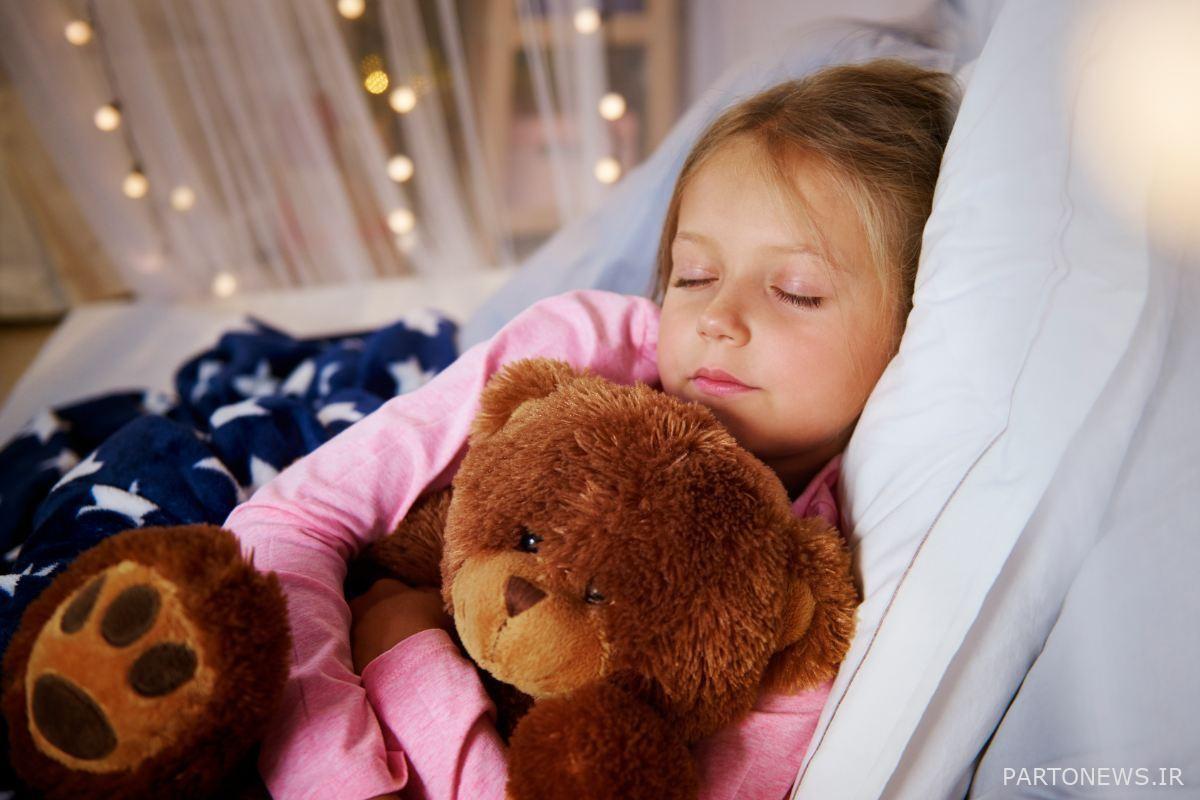The best solution for treating sleep disorders in children

Many parents are involved in a constant battle with sleep disorders in children. Sleep disorders are a common problem among children that can negatively affect their performance in school, extracurricular activities, and social relationships. Almost half of children experience one type of sleep disorder; Even children who did not have sleep problems or had them treated before the corona pandemic may have regressed.
Fortunately, there are various methods for treating sleep disorders in children and adolescents; But what is the role of parents in this direction? First of all, you should recognize this problem and then see a pediatric sleep disorder doctor if necessary. In this article, we are going to review together the best solutions for treating sleep disorders in children; So stay with us until the end of the article.
What is the symptom of sleep disorder in children?
Children’s mental and physical changes at each stage of their development can cause problems for children’s sleep. Your child may suffer from separation anxiety for a while and need your hug in the middle of the night. Sometimes the child is learning words and jumps up excitedly to say the name of everything out loud. Even the tendency to stretch arms and legs can cause sleep disorders in toddlers.
Experiencing too many emotions or being too tired in one day can make the child so anxious that it is not possible for him to sleep peacefully at the end of that day. Usually, the consumption of caffeinated foods also makes it more difficult for children to sleep. Entering a new environment or significant changes in the routine of life is one of the main reasons for increasing anxiety and the appearance of various behavioral problems in children; Sleep is no exception to this rule. Other causes of sleep disorders include:
- Sickness;
- sensitivities;
- sleep apnea;
- night terrors;
- sleepwalking
- Restless leg syndrome (RLS).
Sleep disorder in one-year-old children
Toddlers are highly sensitive to their surroundings and any distraction can disturb their sleep. A one-year-old child may wake up at night due to teething pain or mild separation anxiety. It is interesting to know that the imaginations of toddlers are growing and they cannot completely distinguish imagination from reality. Sometimes, dreams and nightmares cause sleep disorders in toddlers.
It is better that the content of the books and children’s program of your child is suitable for his age. Health experts recommend that you limit the time your child spends on television, tablets and mobile phones and do not put these devices in his bedroom. Children usually put their blanket aside; Therefore, in the colder months, dress your baby warmly. Also, the loud sound of the TV and the conversation of people in the living room may prevent your child from sleeping.
Sleep disorder in hyperactive children
Concentration problems, forgetfulness and impulsive behaviors of children are common symptoms of attention deficit hyperactivity disorder (ADHD); But they can also be a sign of lack of sleep. Since many children with ADHD have sleep problems, it is sometimes difficult to separate the two problems. Sometimes parents ask children’s sleep disorder specialists whether their child really does not have ADHD and his symptoms are due to lack of sleep.
What are the types of sleep disorders in children?
Sleep disorder usually affects a large number of children. Researchers have estimated that about 50% of children experience sleep disorders. According to research, the common types of sleep disorders are as follows:
- obstructive sleep apnea;
- sleepwalking
- disturbed sleep;
- night terrors;
- nightmare;
- Insomnia in children;
- sleep phase delay disorder;
- Restless leg syndrome.
What are the symptoms of sleep disorders in children?
It is possible that your child has problems when sleeping; But how do we know that these symptoms are symptoms of children’s sleep disorders? Some symptoms that may be caused by sleep disorders in children include:
- Your baby lies on the bed; But he doesn’t sleep and for several hours he asks you to read him a book or a lullaby, bring him a drink and food or take him to the bathroom.
- The length of your child’s sleep is not more than about 90 minutes each time; even at night
- Your child feels uncomfortable at night due to itchy feet.
If your child has any of the following symptoms, be sure to see a pediatrician:
- snoring or snoring;
- breathing interruption during sleep;
- Difficulty falling asleep;
- Sleep disturbance during the night;
- difficulty staying awake during the day;
- Unreasonable decrease in energy and daily efficiency;
- Occurrence of unusual events in sleep such as sleepwalking or nightmares;
- Grinding teeth;
- Enuresis;
- restlessness in sleep;
- Inability to wake up first thing in the morning.
What is the treatment of children’s sleep disorder?

You can improve the quality of your child’s sleep by following a series of simple tips. Each child’s needs are different from the other; So do what suits your child. One of the basic needs of every child to sleep comfortably is to have a suitable bed and mattress. If your child has persistent insomnia, only a pediatrician is allowed to prescribe medicine or syrup for children’s sleep disorders. Some of the recommendations of child experts to improve the quality of their sleep are:
- Set a specific bedtime and take your child to bed at the same time every night. The child’s waking time should not differ by more than one to one and a half hours from the rest of the day.
- Consider a bedtime routine for your child; Like reading a story, taking a hot shower or singing a lullaby.
- Do not give caffeinated drinks to children 6 hours before bedtime.
- Adjust the light and temperature of the child’s bedroom.
- Keep the home environment safe and quiet when the child sleeps.
- Do not give children heavy food before bed.
- Do not play exciting games after dinner; Because too much activity at this time prevents the child from sleeping.
- Turn off or mute the TV and mobile phone when the child sleeps.
- Children should not play computer games at least one hour before bedtime.
- When babies and toddlers are sleepy, they should rest in their own bed instead of in your arms or in another room.
- To put your child to sleep, do not go to bed with him.
- When you put your child to bed, stay with him for a limited time; For example, read a story and say good night.
- Put your baby’s favorite doll, pillow or toy in his arms before going to sleep.
- If your child is afraid of the dark, put a dim night light in his room.
- If the child wakes up in the middle of sleep, put him back to bed with as little noise as possible.
- Stick to these plans and if necessary, continue them for several nights.
Conclusion
There are different types of sleep disorders in children and they may occur for different reasons. Children’s sleep patterns change at different stages of their development. The treatment of children’s sleep disorder depends on your patience, perseverance and responsibility; But the good news is that most children’s sleep problems can be solved. If you still have sleep problems despite implementing the mentioned tips to improve your child’s sleep, be sure to Expert Sickness Hi children consult. The doctor may suggest other methods to solve the problem of your child’s sleep disorder or refer you to a pediatric sleep clinic.
Please rate this article
[مجموع: ۱ میانگین: ۵]


